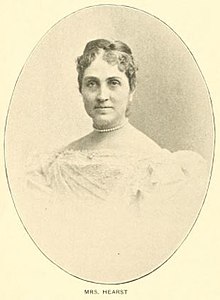 In 1862, at the young age of 19, Phoebe Elizabeth Apperson wed George Hearst, a very successful miner who subsequently rose to the position of U.S. Senator. They had one child, William Randolph Hearst. Phoebe rose to prominence in the 1880s, serving as the first president of the Century Club of California as well as a prominent donor and director of the Golden Gate Kindergarten Association. Hearst provided funding for the construction of a building that would hold kindergarten courses, the association’s offices, and a facility for teacher education. She became UC Berkeley’s first female Regent and a significant philanthropist, serving on the board from 1897 until 1919. In addition to being charitable, she was a feminist and suffragist. Hearst founded the National Parent-Teacher Association and the University of California Museum of Anthropology, which is today known as the Phoebe A. Hearst Museum of Anthropology.
In 1862, at the young age of 19, Phoebe Elizabeth Apperson wed George Hearst, a very successful miner who subsequently rose to the position of U.S. Senator. They had one child, William Randolph Hearst. Phoebe rose to prominence in the 1880s, serving as the first president of the Century Club of California as well as a prominent donor and director of the Golden Gate Kindergarten Association. Hearst provided funding for the construction of a building that would hold kindergarten courses, the association’s offices, and a facility for teacher education. She became UC Berkeley’s first female Regent and a significant philanthropist, serving on the board from 1897 until 1919. In addition to being charitable, she was a feminist and suffragist. Hearst founded the National Parent-Teacher Association and the University of California Museum of Anthropology, which is today known as the Phoebe A. Hearst Museum of Anthropology.
Phoebe traveled extensively and during one of her stays at her home in California, she met with Lua Getsinger who taught her about the Bahá’í Faith. In short time, 1898, Phoebe became a Bahá’í and helped play a key role in spreading the religion in the U.S.
Following the 1893 Parliament of Religions, Hearst had already contributed to Sarah Farmer’s idea to use the Greenacre Inn as a summertime hub for interfaith gatherings and cultural advancement. In November 1898, Hearst, Lua Getsinger, and others made a brief stop in Paris en route to Palestine. While there, Hearst was shocked to see May Bolles (later Maxwell), a later well-known American member of the Baháʼí Faith, bedridden with the chronic malady with which she had been afflicted. Hearst extended Bolles an invitation to go to Palestine with her because she thought the change of scenery would be good for her health. The travel was undertaken as a pilgrimage to see Abdu’l-Bahá, who was at the time the leader of the Bahá’ Faith. Abdu’l-Bahá was the eldest son of the founder of the Bahá’í Faith, Baha’u’llah. In mid December, 1898, the group made their way to Akka and Haifa in Ottoman Palestine. They were the initial Westerners to visit the shrine and encounter Abdu’l-Bahá. Hearst later wrote, “Those three days were the most memorable days of my life.”
Of that visit the Bahá’í writings it states:
“The return of these God-intoxicated pilgrims, some to France, others to the United States, was the signal for an outburst of systematic and sustained activity, which, as it gathered momentum, and spread its ramifications over Western Europe and the states and provinces of the North American continent, grew to so great a scale that ‘Abdu’l-Bahá Himself resolved that as soon as He should be released form His prolonged confinement in Akká, He would undertake a personal mission to the West.”
When Abdu’l-Bahá toured the United States in 1912, Phoebe asked Him to spend a long weekend at her house. Prior to His stay at the Hearst home, Phoebe had been a victim of an incident seeking to extort money from her. During his visit, Abdu’l-Bahá said that a person should not be regarded as a true Bahá’í if they attempt to extort money or things from others.
After Phoebe’s passing in April 1919 the Abdu’l-Bahá wrote that: “Although at present [it] is not known, yet in the future her name shall be uplifted and her fame shall spread abroad”.




